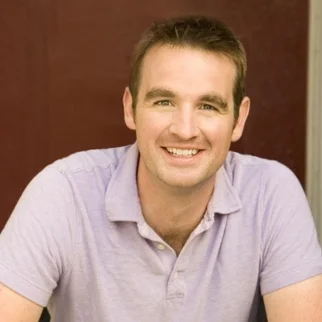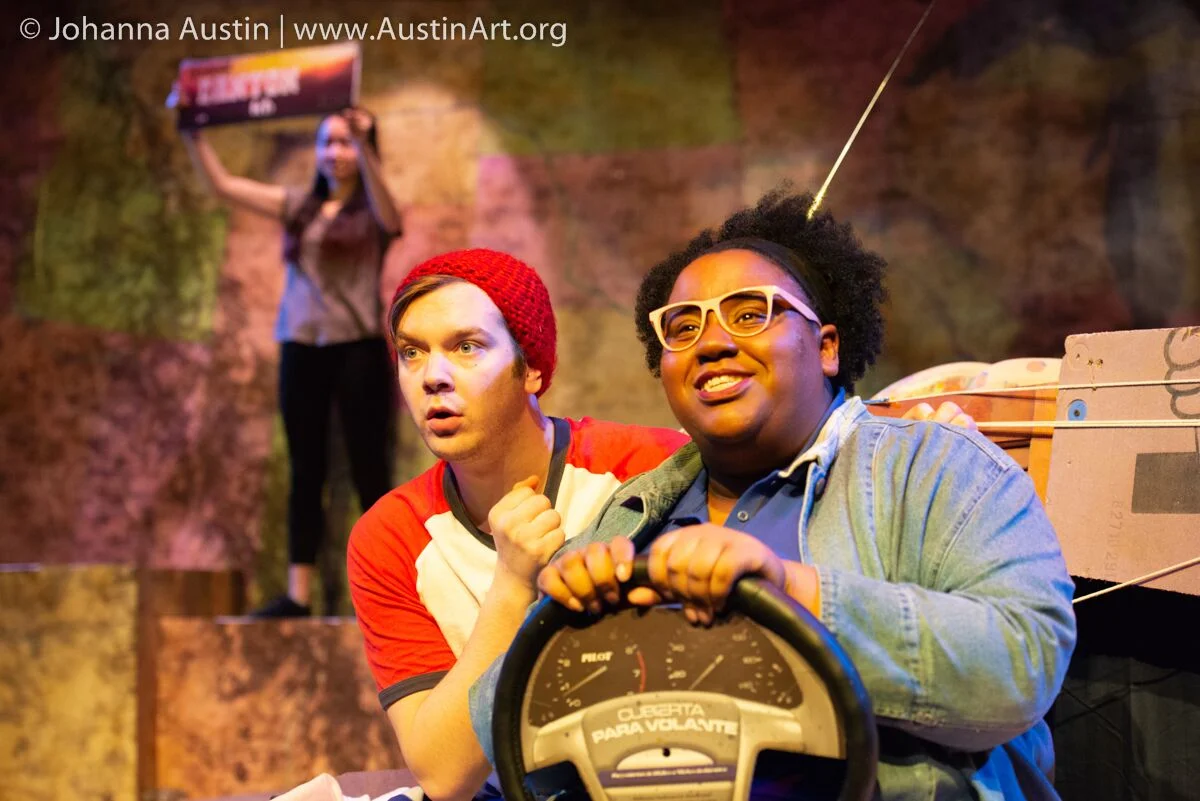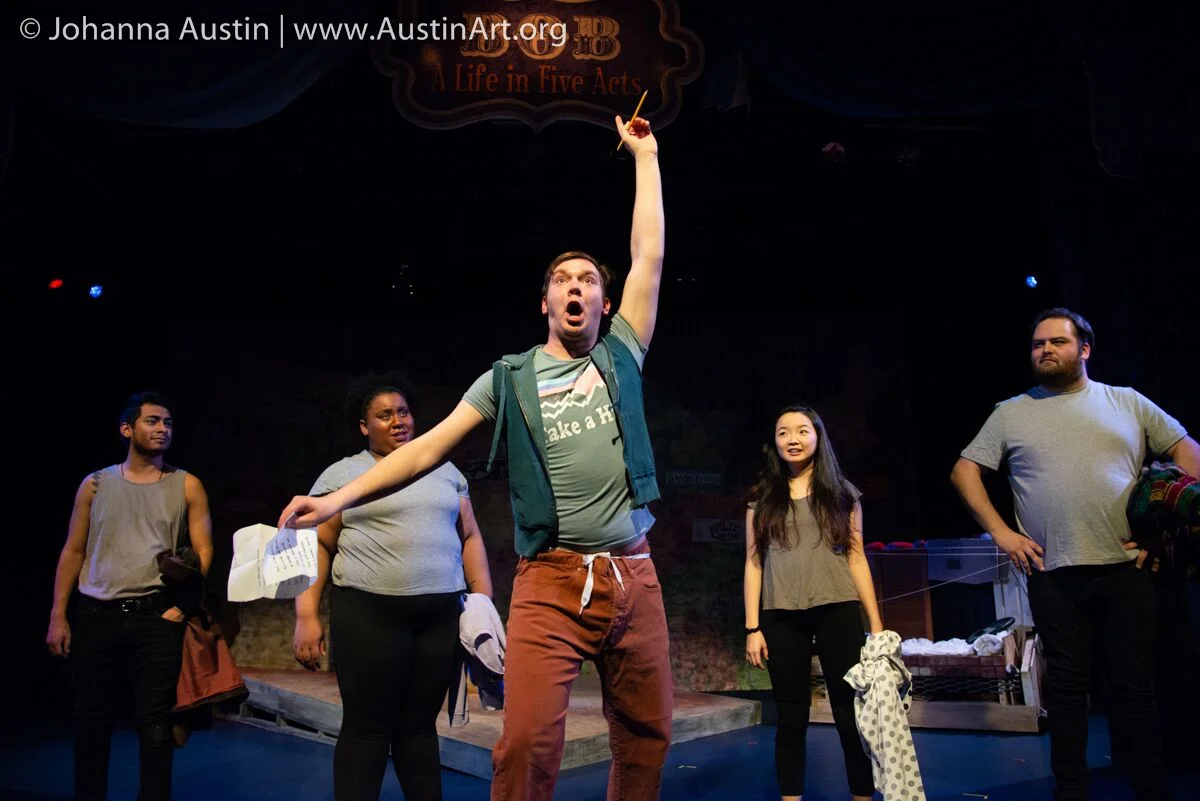Happy BOB Opening! An Interview with Playwright Peter Sinn Nachtrieb
Hello, outcasts and underdogs!
Tonight is our last preview performance for BOB: A LIFE IN FIVE ACTS — which means tomorrow is opening night! In celebration, I asked some questions of the playwright himself, Peter Sinn Nachtrieb. We talked pets, inspiration for BOB, hope and cynicism, and more! Here’s what he had to say.
In the show, Bob travels all across the country. Geographically, where did you begin? Where are you now? What are the most important stops you made along the way?
I was born in San Francisco (in a hospital) and raised in Marin County, which is just north. I went to college at Brown in Providence, Rhode Island and moved to San Francisco after graduating where I’ve lived in the same rent controlled apartment ever since. There were a few road trips in between, plus a stint watching fish spawn in Panama for several months. My playwriting job has given me the good fortune to travel to a lot of different nooks and crannies of the country and hang out in them for a bit, which I’ve always loved.
We love to celebrate Azuka’s outcats and underdogs. Do you have any pets (bonus for pictures)?s
So good!
WE CAN’T HAVE PETS! Ugh. We really want a dog. But since you asked about this, we were the Dogfathers for our friend’s fabulous Boston Terrier, Gozzy. He recently passed away at 15 years old and he was super. Here he is:
One of my favorite parts of the show is the eccentricity of so many of BOB’s unique, quirky experiences (and people) on his journey. Were any of these drawn from either your own life or stories you’d heard?
A number of the locations Bob visits are spots that I’ve been to. The White Castle restaurant in Louisville, Kentucky is the most obvious example. The whole beginning of his life was sparked by walking by that White Castle just before Valentine’s Day and also seeing that it was also a “Safe Place.” (Which is a place of refuge for people in danger but I got it confused in my head with “Safe Surrender” where you can leave a baby, no questions asked. By the time this had been pointed out to me I had already started writing the play and was too far in. Good thing it’s a piece of fiction.)
For all of the people he meets, I wanted every character to be grappling with some major turning point in their life or struggling with a major regret or dream and I want the audience to get a glimpse of that, even if it’s only through one sentence. So I think it was a desire to portray everyone in the midst of their own self-named play that we’ll never get to see. But I don’t think any of those people are based off of a real person.
So you previously said about BOB that ultimately, you hope it doesn’t have an explicit message, but instead asks questions. Is this something you try to adhere to in a lot of your plays?
Playwriting is almost always an investigation for me, a desire to know more about something or to figure out why things are the way they are. I’m asking questions about characters, about culture, and about systems that shape our stories. I also find myself interested in playing with scale and scope of a story and of lives…that our personal journeys are connected to other personal journeys and collectively we are part of a larger, national story, and then we are also part of a story of a species of animal on the planet. There are so many different levels of scale we can situate our lives in, which I’m constantly finding myself fascinated by and wanting to explore through playwriting.
“Our personal journeys are connected to other personal journeys and collectively we are part of a larger, national story…”
Pictured: Claris Park, Paul Harrold, and Sabriaya Shipley in BOB
I think my work seeks to take a slightly oddly-angled look at things and hopes to show the world in a different light, to make normality seem weird, and vice versa, and see if that provokes a conversation about why we believe what we believe and why we do what we do.
So, yeah, I like to spur questions and provoke and challenge assumptions. I’m much less confident in having answers, perhaps because I don’t believe there are tidy answers or messages that personally satisfy me. I like the murky muck.
In the play, characters express both extreme cynicism and incredible optimism. Where do you usually fall on that spectrum and how do you think that expresses itself in your writing?
Depends on the day!!
I find hope and cynicism to be in a constant battle for my soul. Or maybe it’s not a battle and they’re just “in conversation." I think most of my hope and optimism lies in individuals, and the possibility for a person to grow and change and want the best for ourselves and want to be better (even if we’re not successful at it.) I think I hold more cynicism or skepticism about societies and their ability to do good things. A person can do the right thing, but can humanity? Not sure. I do believe that BOB is ultimately a hopeful story.
“I do hope that BOB is ultimately a hopeful story.” Frank Jimenez, Sabriaya Shipley, Paul Harrold, Claris Park, and Dan D’Albis in BOB
If you have one, tell a story of a stranger who had an impact -- however big or small -- on your life.
Whoever stole my wallet in December certainly had an impact!
All the drivers that didn’t run me over when crossing the street...Thanks, all!
People who hold doors open for strangers give me hope. A shout out to everyone who practices micro-kindnesses! That all adds up!
What does it mean to you personally, if anything, to be “great”?
Well, that is the question of the play, isn’t it?
What will your answer be after seeing BOB? Thanks so much for taking the time, Peter! If you haven’t reserved your tickets, hit that button and witness Bob’s journey, playing now through March 17th.
- Lucas




